How Creatine Made Me Lose My Hair and How I Got It Back
By Craig Smith
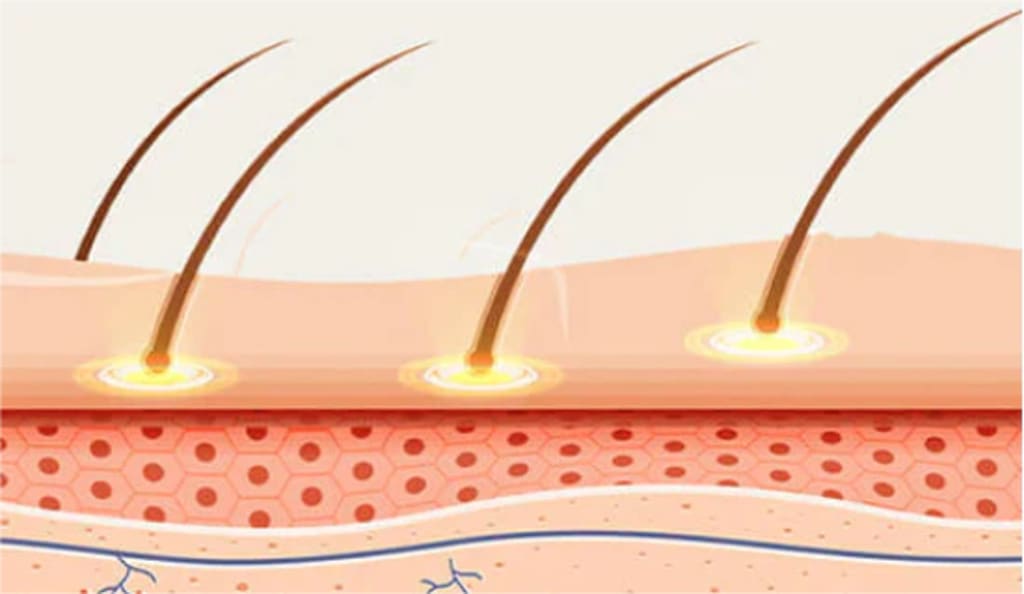
I have always been passionate about fitness and bodybuilding. Ever since I was a kid, I loved working out and lifting weights. I wanted to build a strong and muscular physique that would make me feel confident and attractive.
I also loved experimenting with different supplements that could help me achieve my fitness goals faster and easier. One of the supplements that I used regularly was creatine. Creatine is one of the most popular and widely researched supplements for enhancing muscle strength, power, and performance. It is naturally produced by your body and found in foods like meat and fish. It can also be taken as a supplement to boost your creatine levels and improve your exercise performance.
I started using creatine when I was 18 years old. I followed the recommended dosage of 3 to 5 grams per day and took it with carbs or protein before or after my workouts. I noticed that creatine helped me lift heavier weights, perform more reps, and sprint faster. I also noticed that my muscles looked bigger and fuller due to the increased water retention.
I was very happy with the results of creatine. I felt like I was getting closer to my dream physique every day. I didn’t pay attention to any possible side effects or risks of creatine. I thought it was a safe and natural supplement that could only benefit me.
But I was wrong.
How creatine affected my hair
I didn’t notice it at first, but after a few months of using creatine, I started to see more hairs on my pillow, in the shower, and on my comb. I thought it was normal and nothing to worry about. Maybe it was just seasonal shedding or stress-related hair loss.
But as time went by, the hair loss became more noticeable and alarming. I started to see bald patches on my scalp, especially on the temples and the crown. My hairline was receding and my hair was thinning all over. I felt like I was losing a part of my identity and beauty.
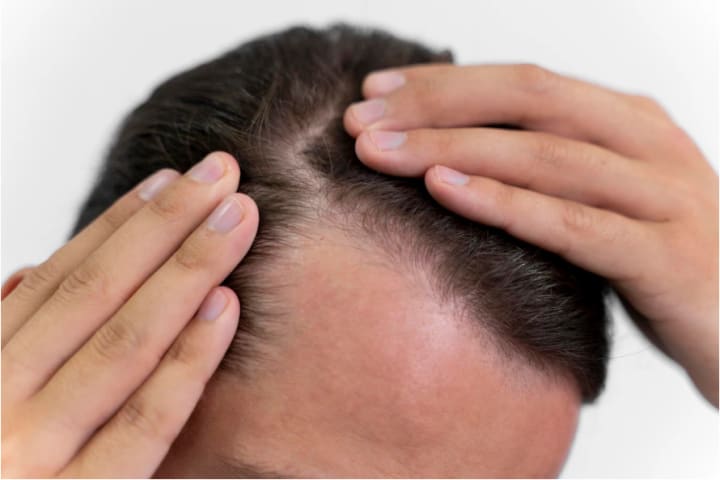
I was shocked and scared by what was happening to me. I didn’t understand why or how creatine could cause hair loss. I searched online for answers and found out that creatine may indirectly affect the levels of a hormone that can cause hair loss. This hormone is called dihydrotestosterone (DHT), which is derived from testosterone, the male sex hormone.
DHT is more potent than testosterone and can bind to specific receptors in your hair follicles. This can cause your hair follicles to shrink, shorten their growth cycle, and produce thinner and weaker hairs. Over time, this can lead to hair thinning and baldness.
The link between creatine and DHT levels is based on a small study conducted in 2009 on 20 college-age rugby players. The study found that after taking creatine supplements for 3 weeks, the participants had a 56% increase in their DHT levels compared to baseline. The researchers suggested that creatine may increase the activity of an enzyme called 5-alpha reductase i The enzyme that converts testosterone to DHT. , which is responsible for converting testosterone to DHT.
However, this study has some limitations that make it hard to generalize its findings to the general population. For example:
The study had a small sample size and did not have a control group.
The study did not measure the actual hair loss or hair quality of the participants.
The study did not account for other factors that may affect DHT levels, such as diet, stress, genetics, or medication.
The study used a high dose of creatine (25 grams per day) for a short period of time (3 weeks), which may not reflect the typical usage of creatine by most people.
Therefore, more research is needed to confirm the link between creatine and DHT levels and to determine whether creatine supplementation can actually cause hair loss or baldness.
But for me, it was too late. I had already lost most of my hair due to creatine.
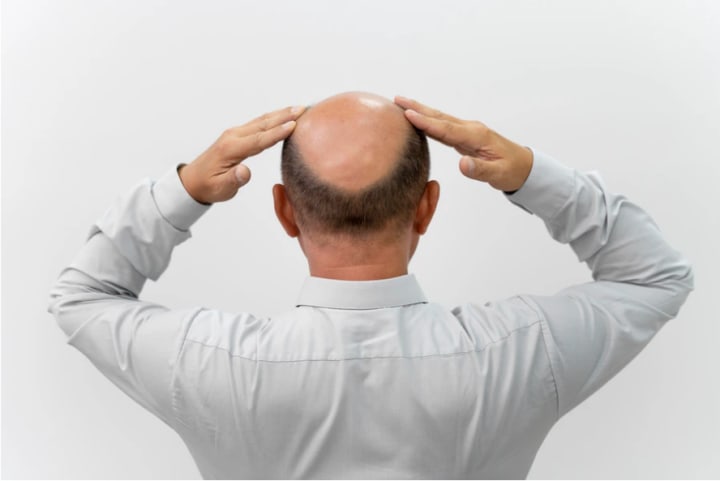
How I stopped using creatine and regained my hair
I decided to stop using creatine immediately after finding out about its possible link to hair loss. I also consulted my doctor and a trichologist i A specialist in the diagnosis and treatment of hair and scalp disorders. . They confirmed that my hair loss was likely caused by creatine-induced DHT increase. They also prescribed me some medication that could help me prevent or treat hair loss by blocking the action of DHT or stimulating hair growth.
The medication that they gave me was minoxidil i A topical solution that can increase blood flow and nutrient delivery to your hair follicles and prolong their growth phase. , which is applied directly to your scalp twice a day, and finasteride i An oral tablet that can inhibit the enzyme that converts testosterone to DHT and reduce its levels in your scalp. , which is taken once a day by mouth.
However, these medications had some side effects, such as irritation, itching, dryness, or sexual dysfunction. I was not comfortable with taking them for a long time. I also wanted to try some natural remedies that could help me prevent or treat hair loss by nourishing, moisturizing, and protecting my hair and scalp.
Some of the natural remedies that I tried were:
Wild hair growth oil: This is a plant-based oil that contains a blend of natural oils, such as olive, coconut, jojoba, and pumpkin seed oils, and a mix of herbal extracts, such as rosehip, mushroom, pomegranate, and acerola. These ingredients can help your hair grow faster, thicker, and stronger by providing it with essential nutrients, moisture, and protection. I used wild hair growth oil as a pre-shampoo treatment or a leave-in conditioner two or three times a week.
Biotin: This is a B vitamin that is essential for the production of keratin i The protein that makes up most of your hair structure. , the main component of your hair. Biotin can help you prevent or treat hair loss by strengthening your hair shafts and preventing breakage and split ends. I got biotin from foods like eggs, nuts, seeds, dairy products, or meat. I also took biotin supplements with my doctor’s approval.
Saw palmetto: This is a plant that has been shown to have anti-androgenic effects that can block the action of 5-alpha reductase and lower the levels of DHT in your scalp. Saw palmetto can help you prevent or treat hair loss by reducing the shrinkage and miniaturization of your hair follicles. I took saw palmetto supplements with my doctor’s approval.
I also tried red light therapy for hair loss reviews. Red light therapy is a non-invasive treatment that uses low-level red or near-infrared light to stimulate cellular activity and healing in various tissues of the body. It can also benefit your hair by increasing its growth rate, thickness, density, and strength.
Red light therapy works for hair by delivering photons of light to your scalp and hair follicles. These photons are absorbed by the mitochondria i The organelles in cells that produce energy through cellular respiration. , the energy-producing units of your cells. This triggers a cascade of biochemical reactions that increase the production of adenosine triphosphate (ATP) i The molecule that stores and transfers energy within cells. , the main source of energy for cellular functions.
By increasing the ATP levels in your scalp and hair follicles, red light therapy can:
Stimulate the anagen phase i The active growth phase of the hair cycle. of the hair cycle and prolong its duration. This means that more hairs will grow faster and longer.
Increase the blood flow and oxygen delivery to your scalp and hair follicles. This means that more nutrients and growth factors will reach your hairs and support their health.
Reduce the inflammation and oxidative stress in your scalp and hair follicles. This means that less damage and inflammation will occur to your hairs and their surrounding tissues.
Inhibit the action of 5-alpha reductase and lower the levels of DHT in your scalp. This means that less hairs will fall out due to hormonal causes.
I used red light therapy for my hair by using a red light therapy cap, which is a wearable device that fits over your head like a cap or a helmet. It has built-in LED lights that emit red or near-infrared light to cover your entire scalp area. It is convenient to use at home or anywhere else as it is portable and battery-operated. I used it for 20 minutes per session, three times a week.
What results did I see from stopping creatine and using these remedies for my hair?
I was amazed by the results I saw from stopping creatine and using these remedies for my hair. Within a few weeks, I noticed that my hair was falling out less and that it looked more shiny and smooth. Within a few months, I noticed that my hair was growing faster and thicker and that it had more volume and bounce. I also noticed that my natural hair color was more vibrant and that I had fewer gray hairs.
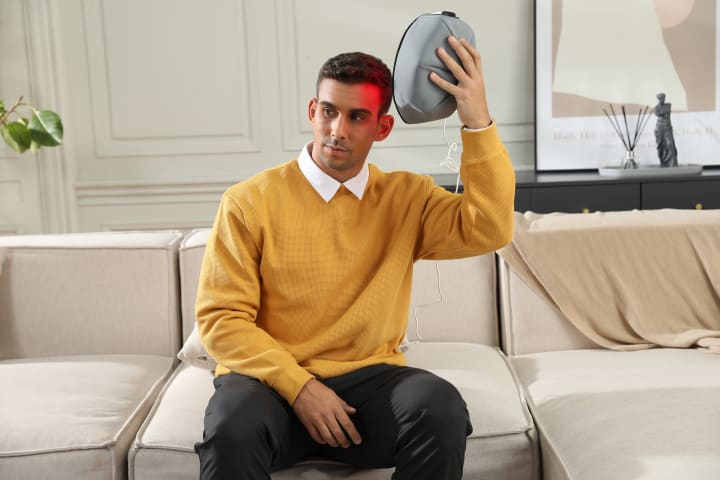
I was thrilled by the changes in my hair. I felt more confident and beautiful. I started getting compliments from my friends and family on how great my hair looked. I felt like I had regained a part of my identity and beauty.
I have been using these remedies for my hair for over a year now and I am still very happy with the results. My hair is healthier, stronger, and longer than ever before. I love my hair and I love myself.
Conclusion
Creatine is a popular supplement for enhancing muscle strength, power, and performance. However, it may also have an indirect effect on hair loss by increasing the levels of DHT in your scalp. This can cause your hair follicles to shrink and produce thinner and weaker hairs.
However, creatine does not directly cause hair loss, and the link between creatine and DHT levels is based on a small study that has not been replicated by other researchers. Therefore, more research is needed to confirm the link between creatine and hair loss and to determine whether creatine supplementation can actually cause hair loss or baldness.
If you are worried about hair loss or baldness, whether it is caused by creatine or other factors, you can prevent or treat it by consulting your doctor, using medication, trying natural remedies, or trying the best red light therapy. These methods can help you block the action of DHT, stimulate hair growth, and improve hair quality.
I hope this article has inspired you to try these remedies for your hair. If you have any questions or comments, feel free to share them below. I would love to hear from you!
About the Creator
Health First
Let's get healthy! And things will change someday.


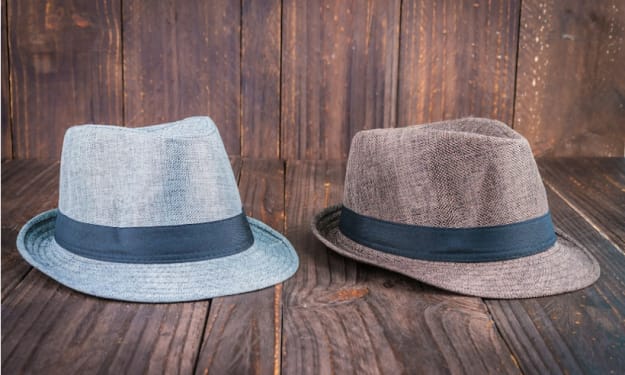



Comments
There are no comments for this story
Be the first to respond and start the conversation.